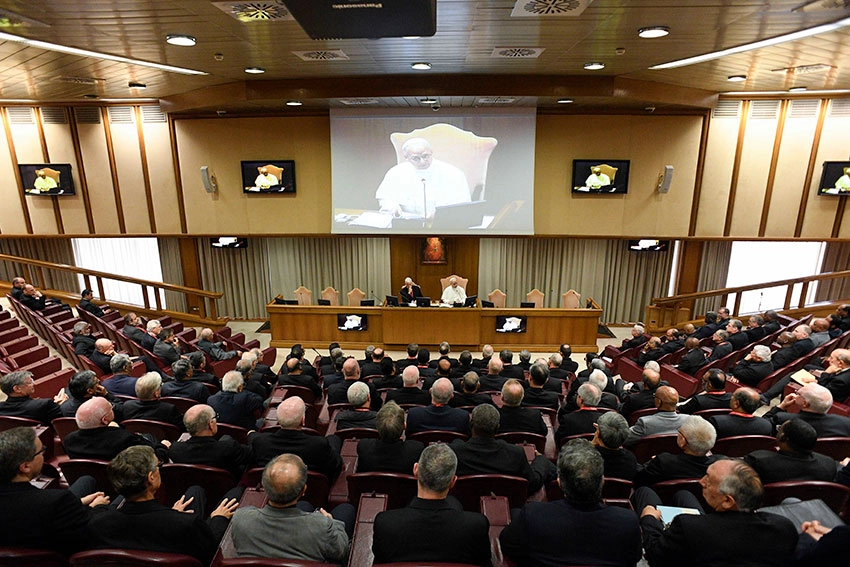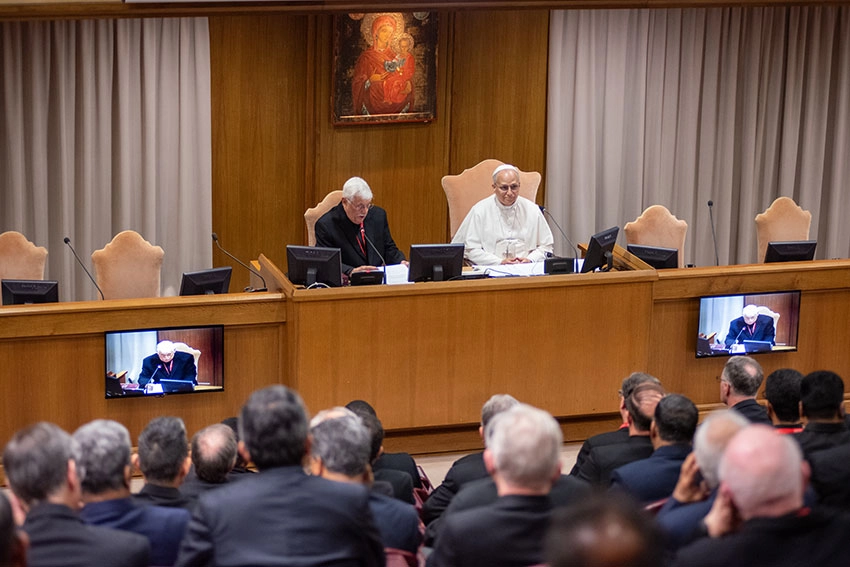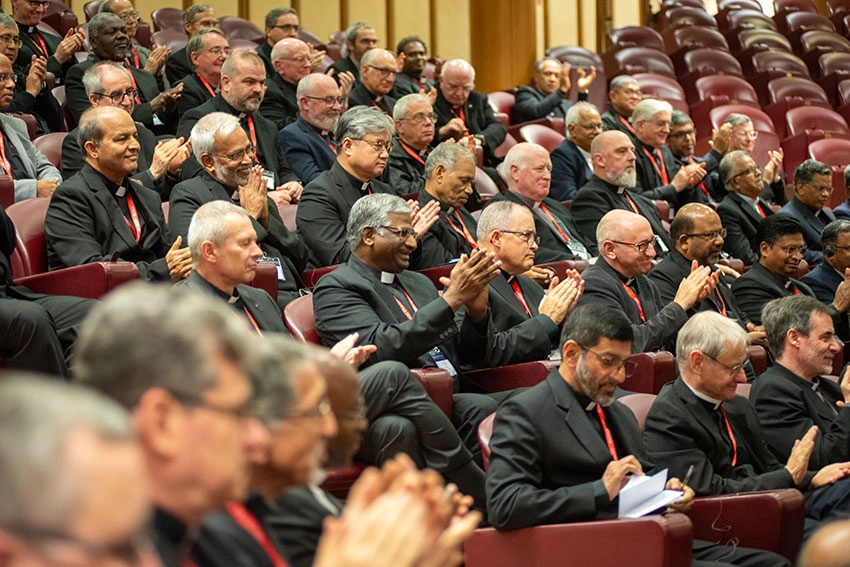 Photo: © Vatican Media
Photo: © Vatican Media
“Today, I repeat: the Church needs you at the frontiers – whether they be geographical, cultural, intellectual, or spiritual”, the Holy Father said, encouraging Jesuits to continue their service to the Church and the world, despite rapid cultural, economic, and political changes.
Father General Arturo Sosa led the group of about 100 Jesuits, including Provincials and Regional Superiors, Presidents of Conferences, General Counsellors, Secretaries, and staff translators.
Presenting the delegation to the Pope, Father Sosa reiterated the Society’s availability –as individuals and as an apostolic body –to serve the universal mission of the Church, wherever the Holy Father desires. He also recalled that in 2019, Pope Francis gave the Society orientations to guide its mission through the Universal Apostolic Preferences (UAPs).
Father General explained that the meeting of Major Superiors held in these days has set out to “reflect on the missionary dimension of the charism of the Society of Jesus”.
 Photo: © Vatican Media
Photo: © Vatican Media
From the very beginning, Jesuits have had a special relationship with the Supreme Pontiff. When St Ignatius and his companions aimed to serve in the missions, they went to Rome and offered themselves to the Pope. This relationship is further underscored by the unique fourth vow of obedience that Jesuits take to the Pope regarding mission, in addition to the usual vows of poverty, chastity, and obedience.
In his address to the Jesuits, Pope Leo identified some frontier areas today. He noted that the path of synodality within the Church “calls all of us to listen more deeply to the Holy Spirit and to one another”, so that our ministries and structures “may be more agile, more transparent and more responsive to the Gospel”.
Another frontier, said the Pope, lies in “reconciliation and justice”. In a world ravaged by inequalities and conflicts, he called on the Society to oppose the “globalization of powerlessness” with a culture of reconciliation, trusting that good will prevail over evil.
Pope Leo also pointed at artificial intelligence as another important frontier. He called for discernment on the use of digital platforms to evangelize and form communities in the face of technologies that carry risks of isolation, and expose people to new forms of manipulation.
“The Society’s Universal Apostolic Preferences… are certainly frontiers calling for discernment and courage”, Pope Leo XIV affirmed.
 Photo: © Vatican Media
Photo: © Vatican Media
Six years ago, Pope Francis confirmed the four UAPs identified by the Society: To show the way to God through the Spiritual Exercises and discernment; walking with the excluded; accompanying young people in the creation of a hope-filled future; and caring for our common home, as privileged paths of mission for ten years (2019-2029).
“I encourage you to meet people in that restlessness: in retreat houses, universities, social media, parishes, and informal spaces where seekers gather”, Pope Leo urged, highlighting that the first Preference responds “to the deep longing of the human heart” of many who seek meaning around the world.
Concerning the second Preference, the Holy Father encouraged the Society to confront the “dictatorship of an economy that kills”, and not to give into resentment, “compassion fatigue” or fatalism, in the face of the many poor people in the world whose dignity has been violated.
He stressed the urgency of accompanying young people today, noting that the Church needs to find and speak the language of the youth through actions, presence and words. “It is important to form spaces where they can encounter Christ, discover their vocation, and work for the Kingdom”, he insisted. In this regard, he identifies the next World Youth Day in Korea (2027) as a “key moment for this mission”.
Pope Leo called for humble collaboration in response to the fourth Preference, noting that “young people demand change” in our approach to the environmental crisis. He added that “ecological conversion is deeply spiritual; it is about renewing our relationship with God, with one another, and with creation”.
 Photo: © Vatican Media
Photo: © Vatican Media
The Holy Father also reminded Jesuits to remain rooted in Christ through prayer, the sacraments, and devotion to the Sacred Heart. “From this rootedness,” he noted, “you will have the courage to walk anywhere: to speak truth, to reconcile, to heal, to labour for justice, to set captives free. No frontier will be beyond your reach if you walk with Christ.”
“My hope for the Society of Jesus is that you may read the signs of the times with spiritual depth; that you embrace what promotes human dignity and reject what diminishes it”; the Pope said, expressing his desire that the Society be “agile, creative, discerning, and always in mission”.
Following the audience with the Pope, the rest of the eighth day of the Meeting of Major Superiors was dedicated to “Re-imagining the structures of governance”. Fr Benedictus Hari Juliawan, Provincial of Indonesia, and Fr Claudio Paul from the General Curia gave a presentation that provided the Major Superiors material for group discussions and a plenary session.
Address of Pope Leo XIV to the Major Superiors of the Society of Jesus
In the name of the Father, and of the Son, and of the Holy Spirit.
Peace be with you!
Father Sosa,
Dear friends,
I would like to welcome all of you to the Vatican this morning and thank you for your presence. I especially thank your Superior General for his kind words. I pray that your meeting will be fruitful, and that, through it, the Holy Spirit will confirm you in your vocation and help the members of the Society of Jesus to discern new ways of living out your mission in today’s world.
We live in what many describe as a change of epoch, an age marked by rapid shifts in culture, economics, technology and politics. In particular, artificial intelligence and other innovations are reshaping our understanding of work and relationships, and even raising questions about human identity. Ecological degradation threatens our common home. Political systems often fail to respond to the cries of the poor. Populism and ideological polarization deepen divisions within and among nations. Many are affected by consumerism, individualism, and indifference.
Yet into this world, Christ still sends his disciples. The Society of Jesus has long been present where humanity’s needs meet God’s saving love: through spiritual guidance, intellectual formation, service among the poor and Christian witness at cultural frontiers. Saint Ignatius of Loyola and his companions did not fear uncertainty or difficulty; they went to the margins, where faith and reason intersected with new cultures and great challenges.
Indeed, Saint Paul VI said: “Wherever in the Church, even in the most difficult and extreme fields, at the crossroads of ideologies… there have been, and there are, Jesuits” (Address to the 32nd General Congregation of the Jesuits, 3 December 1974). In a similar vein, Pope Benedict XVI called for men “with deep faith, sound culture, and genuine human and social sensitivity” to serve at these “frontiers,” showing the harmony of faith and reason, and revealing Christ’s face to those who do not yet know him (cf. Address to the Fathers of the General Congregation of the Society of Jesus, 21 February 2008).
Today, I repeat: the Church needs you at the frontiers — whether they be geographical, cultural, intellectual or spiritual. These are places of risk, where familiar maps are no longer sufficient. There, like Ignatius and the Jesuit martyrs who followed him, you are called to discern, innovate and trust in Christ, “with the belt of truth buckled around your waist, with the breastplate of righteousness in place, and with your feet fitted with the readiness that comes from the gospel of peace” (Eph 6:14-15). When the Spirit leads the apostolic body elsewhere for a greater good, this may require letting go of long-cherished structures or roles — an exercise of Ignatian ‘holy indifference.’
A major frontier today is the path of synodality within the Church. The synodal journey calls all of us to listen more deeply to the Holy Spirit and to one another, so that our structures and ministries may be more agile, more transparent, and more responsive to the Gospel. I thank you for your contributions to the synodal process, especially in helping ecclesial communities discern how to walk together in hope.
Another essential frontier lies in reconciliation and justice, especially in a world torn apart by conflict, inequality and abuse. Today, many suffer exclusion, and many wounds remain unhealed across generations and peoples. As I recently reflected in recalling my venerable predecessor’s visit to Lampedusa, we must oppose the “globalization of powerlessness” with a culture of reconciliation — meeting one another in truth, forgiveness and healing; we must become experts in reconciliation, confident that good is stronger than evil (cf. Video Message for the proposal of the Lampedusa’s UNESCO Intangible Cultural Heritage Candidacy, 12 September 2025).
Technology, especially artificial intelligence, is also an important frontier. It holds potential for human flourishing but also carries risks of isolation, loss of work and new forms of manipulation. The Church must help guide these developments ethically, defending human dignity and promoting the common good. We need to discern how to use digital platforms to evangelize, to form communities and to challenge the false gods of consumerism, power and self-sufficiency.
The Society’s Universal Apostolic Preferences, which Pope Francis confirmed in 2019 as privileged paths of mission, are certainly frontiers calling for discernment and courage. Your first preference — to show the way to God through the Spiritual Exercises and discernment — responds to the deep longing of the human heart. In every continent, even in secularized societies, many search for meaning, often without realizing it. As Saint Augustine said, “You have made us for yourself, O Lord, and our hearts are restless until they rest in you” (Confessions, 1,1). I encourage you to meet people in that restlessness: in retreat houses, universities, social media, parishes and informal spaces where seekers gather. Communicate the joy of the Gospel with humility and conviction. Remain contemplatives in action, rooted in daily intimacy with Christ, for only those close to him can lead others to him.
Your second preference calls you to walk with the poor, the outcasts of the world and those whose dignity has been violated. Many today are victims of an economic system driven by profit above the dignity of the person. In my recent Exhortation, Dilexi Te, I emphasized the need to confront “the dictatorship of an economy that kills,” where the wealth of a few grows exponentially while the majority are left behind (cf. 92). This global imbalance pushes countless people to migrate in search of survival. They leave home, culture and family, often facing rejection and hostility. True discipleship requires both denunciation of injustice and the proposal of new models rooted in solidarity and the common good. In this regard, your universities, social centers, publications and institutions, like the Jesuit Refugee Service, can be powerful channels to promote systemic change. Despite the obstacles or failures that we may experience at times in carrying out this service, we must avoid giving in to resentment, or falling into a ‘compassion fatigue’ or fatalism. Instead, we must trust in the transformative power of God’s love, like the mustard seed that becomes a great tree (cf. Mt 13:31-32).
Your third preference — accompanying young people toward a hope-filled future — is urgent. The youth of today are diverse: students, migrants, activists, entrepreneurs, religious, and those on the margins. Despite their variety, they share a thirst for authenticity and transformation. They are “on the move,” searching for meaning and justice. The Church needs to find and speak their language — through actions and presence as well as words. As a result, it is important to form spaces where they can encounter Christ, discover their vocation, and work for the Kingdom. The next World Youth Day in Korea will be a key moment for this mission.
Your fourth preference, caring for our common home, responds to a cry that is both human and divine. As Pope Francis affirmed in Laudato Si’, “Young people demand change. They wonder how anyone can claim to be building a better future without thinking of the environmental crisis” (13). Ecological conversion is deeply spiritual; it is about renewing our relationship with God, with one another and with creation. In this effort, humble collaboration is essential, recognizing that no single institution can face this challenge alone. Let your communities be examples of ecological sustainability, simplicity and gratitude for God’s gifts.
The urgency to proclaim the Gospel today is as great as in the time of Saint Ignatius. The Lord says through the prophet Isaiah: “I am doing a new thing; now it springs forth, do you not see it?” (Isa 43:19) Your mission, dear brothers, is to help the world perceive this newness — to sow hope where despair seems dominant, to bring light where darkness reigns.
To accomplish this, I encourage you to remain close to Jesus. As the Gospel tells us, the first disciples stayed with him “the whole day” (cf. Jn 1). Remain with him through private prayer, the celebration of the Sacraments, devotion to his Sacred Heart and adoration of the Blessed Sacrament. In a different yet still powerful way, remain with him by recognizing his presence in community life. From this rootedness, you will have the courage to walk anywhere: to speak truth, to reconcile, to heal, to labor for justice, to set captives free. No frontier will be beyond your reach if you walk with Christ.
My hope for the Society of Jesus is that you may read the signs of the times with spiritual depth; that you embrace what promotes human dignity and reject what diminishes it; that you be agile, creative, discerning and always in mission — “in fieri,” as Pope Francis said at your last General Congregation (Address to the 36th General Congregation of the Society of Jesus, 24 October 2016). May the Lord lead you to the frontiers of today and beyond, renewing the Church and building a Kingdom of justice, love and truth.
With gratitude for your service, I impart my Apostolic Blessing.